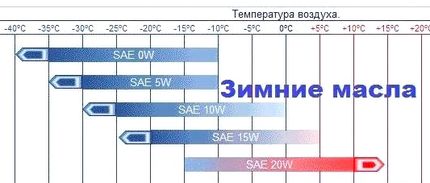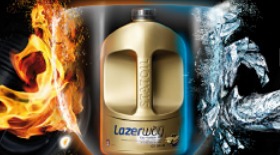
Which oil is better in winter
Content
With the onset of frost, many car owners are interested in the question of whether what oil to fill in for the winter. For different regions of our country, oils labeled 10W-40, 0W-30, 5W30 or 5W-40 are used. Each of them has different viscosity characteristics and minimum operating temperature. So, oil marked 0W can be operated at a minimum temperature of -35°C, 5W - at -30°C, and 10W - up to -25°C, respectively. also the choice depends on the type of oil base. Since mineral lubricants have a high freezing point, they are not used. Instead, synthetic or, in extreme cases, semi-synthetic oils are used. This is due to the fact that they are more modern and have high performance characteristics.
How to choose oil for the winter
Viscosity comparison
the basic parameter that allows you to answer the question of which oil is better to fill in for the winter is SAE viscosity. According to this document, there are eight winter (from 0W to 25W) and 9 summer. Everything is simple here. From the first number in the winter oil label before the letter W (the letter stands for the abbreviated English word Winter - winter), you need to subtract the number 35, as a result of which you will get a negative temperature value in degrees Celsius.
Based on this, it is impossible to say for sure which oil is better than 0W30, 5W30 or some other in winter. To do this, you need to carry out the appropriate calculations, and find out the lower permissible temperature for their operation. For example, 0W30 oil is suitable for more northern regions, where the temperature drops to -35 ° C in winter, and 5W30 oil, respectively, to -30 ° C. Their summer characteristic is the same (characterized by the number 30), so in this context it is not important.
| Low temperature viscosity value | The value of the minimum air temperature for oil operation |
|---|---|
| 0W | -35 ° C |
| 5W | -30 ° C |
| 10w | -25 ° C |
| 15w | -20 ° C |
| 20w | -15 ° C |
| 25w | -10 ° C |
Occasionally, motor oils can be found on sale, in which the characteristics, namely, viscosity, are indicated in accordance with GOST 17479.1-2015. There are similarly four classes of winter oils. So, the winter indices of the specified GOST correspond to the following SAE standards: 3 - 5W, 4 - 10W, 5 - 15W, 6 - 20W.
However, when choosing one or another oil cannot be guided only by low-temperature viscosity. There are also other sections in the SAE standard that describe the characteristics of oils. The oil you choose must necessarily meet, in all parameters and standards, the requirements that the manufacturer of your car imposes on it. You will find the relevant information in the documentation or manual for the car.
Which oil is better synthetic or semi-synthetic in winter
The question of which oil is better - synthetic or semi-synthetic is relevant at any time of the year. However, as regards the negative temperature, the low-temperature viscosity mentioned above is much more important in this context. As for the type of oil, the reasoning that “synthetics” better protects ICE parts at any time of the year is fair. And considering that after long periods of downtime, their geometric dimensions change (albeit not much), then protection for them during start-up is extremely important.
Based on the above, the following conclusion can be drawn. The first thing you should pay attention to is the low temperature viscosity value. The second is the recommendations of the manufacturer of your car. Thirdly, if you have a modern expensive foreign car with a new (or recently refurbished ICE), then you should use synthetic oil. If you are the owner of a medium or budget car, and do not want to overpay, then “semi-synthetics” is quite suitable for you. As for mineral oil, it is not recommended to use it, because in severe frosts it thickens very much and does not protect the internal combustion engine from damage and / or wear.
oil for the winter which is better for gasoline engines
Now let's look at the TOP 5 oils popular among domestic motorists for gasoline engines (although some of them are universal, that is, they can also be poured into diesel engines). The rating was compiled on the basis of operational characteristics, namely, frost resistance. Naturally, there is a huge variety of lubricants on the market today, so the list can be expanded many times over. If you have your own opinion on this matter, please share it in the comments.
| Name | Characteristics, standards and approvals manufacturers | Price at the beginning of 2018 | Description |
|---|---|---|---|
| POLYMERIUM XPRO1 5W40 SN | API SN/CF | ACEA A3/B4, A3/B3 | MB-Approval 229.3/229.5 | VW 502 00 / 505 00 | Renault RN 0700 / 0710 | BMW LL-01 | Porsche A40 | Opel GM-LL-B025 | | 1570 rubles for a 4 liter canister | For all types of petrol and diesel engines (without particulate filters) |
| G-ENERGY F SYNTH 5W-30 | API SM/CF, ACEA A3/B4, 229.5 MB, VW 502/00, BMW LL-505, Renault RN00, OPEL LL-A/B-01 | 1500 rubles for a 4 liter canister | For gasoline and diesel engines (including turbocharged ones) of cars, minibuses and light trucks operating in various operating conditions, including severe ones. |
| Neste City Pro LL 5W-30 | SAE 5W-30 GM-LL-A-025 (gasoline engines), GM-LL-B-025 (diesel engines); ACEA A3, B3, B4; API SL, SJ/CF; VW 502.00/505.00; MB 229.5; BMW Longlife-01; Recommended for use when Fiat 9.55535-G1 oil is required | 1300 rubles for 4 liters | Full synthetic oil for GM vehicles: Opel and Saab |
| Addinol Super Light MV 0540 5W-40 | API: SN, CF, ACEA: A3/B4; approvals — VW 502 00, VW 505 00, MB 226.5, MB 229.5, BMW Longlife-01, Porsche A40, Renault RN0700, Renault RN0710 | 1400 rubles for 4 liters | Synthetic oil for gasoline and diesel engines |
| Lukoil Genesis Advanced 10W-40 | SN/CF, MB 229.3, A3/B4/B3, PSA B71 2294, B71 2300, RN 0700/0710, GM LL-A/B-025, Fiat 9.55535-G2, VW 502.00/505.00 | 900 rubles for 4 liters | All-weather oil based on synthetic technologies for use in gasoline and diesel internal combustion engines of new and used cars of foreign and domestic production in heavy operating conditions |
Rating of oils for gasoline engines
Also, when choosing an oil, you need to pay attention to the following nuance. As the internal combustion engine wears out (its mileage increases), the gaps between its individual parts increase. And this leads to need to use a thicker oil (eg 5W instead of 0W). Otherwise, the oil will not perform the functions assigned to it, and protect the internal combustion engine from wear. However, when assessing, it is necessary to take into account not only the mileage, but also the state of the internal combustion engine (it is clear that it depends on the operating conditions of the car, the driver’s driving style, and so on).
What kind of oil to fill in a diesel engine in winter
For diesel engines, all the above reasoning is also valid. First of all, you need to focus on the value of low-temperature viscosity and the recommendations of the manufacturer. However, it is better not to use multigrade oil for diesel engines.. The fact is that such engines need more protection from the lubricant, and the latter "gets old" much faster. Therefore, selection for viscosity and other characteristics (namely, the standards and tolerances of the automaker) is more critical for them.

Oil for diesel engines
Motor oils for diesel engines are characterized by strong antioxidant and lubricating properties. The characteristics and tolerances of turbodiesel oil are also stricter... Read more
So, according to the SAE standard for diesel engines, everything is similar to gasoline ICE. That is, then winter oil must be selected according to viscosity, in this case low temperature. In accordance with the technical characteristics and reviews of car owners of cars with diesel ICEs, the following brands of motor oils are a good option for the winter.
| Name | Features | Price at the beginning of 2018 | Description |
|---|---|---|---|
| Motul 4100 Turbolight 10W-40 | ACEA A3/B4; API SL/CF. Tolerances — VW 505.00; MB 229.1 | 500 rubles for 1 liter | Universal oil, suitable for cars and jeeps |
| Mobil Delvac 5W-40 | API CI-4 / CH-4 / CG-4 / CF-4 / CF / SL / SJ-ACEA E5 / E4 / E3. Approvals - Caterpillar ECF-1; Cummins CES 20072/20071; DAF Extended Drain; DDC (4 cycles) 7SE270; Global DHD-1; JASO DH-1; Renault RXD. | 2000 rubles for 4 liters | Universal grease that can be used in passenger cars (including high loads and speeds) and special equipment |
| Mannol Diesel Extra 10w40 | API CH-4/SL;ACEA B3/A3;VW 505.00/502.00. | 900 rubles for 5 liters | For passenger cars |
| ZIC X5000 10w40 | ACEA E7, A3/B4API CI-4/SL; MB-Approval 228.3MAN 3275 Volvo VDS-3Cummins 20072, 20077MACK EO-M Plus | 250 rubles for 1 liter | Universal oil that can be used in any technique |
| Castrol Magnatec 5W-40 | ACEA A3/B3, A3/B4 API SN/CF BMW Longlife-01 MB-Approval 229.3 Renault RN 0700 / RN 0710 VW 502 00 / 505 00 | 270 rubles for 1 liter | Universal oil for cars and trucks |
Rating of oils for diesel engines in winter
you also need to remember that most commercially available motor oils are universal, that is, those that can be used in both gasoline and diesel ICEs. Therefore, when buying, first of all, you need to pay attention to the characteristics indicated on the canister, while knowing the tolerances and requirements of the manufacturer of your car.
Hack and predictor Aviator
Two basic factors on the basis of which you should make a choice of this or that oil for gasoline or diesel engines in the winter - vehicle manufacturer requirements as well as low temperature viscosity. And it, in turn, must be taken into account on the basis of the climatic conditions of residence, namely, how low the temperature drops in winter. And of course, do not forget about tolerances. If the selected oil meets all the listed parameters, you can safely buy it. As for a specific manufacturer, it is impossible to give specific recommendations. At present, most of the world's popular brands produce products of approximately the same quality and meet the same standards. Therefore, pricing and marketing come to the fore. If you do not want to overpay, then on the market you can easily find a decent brand under which oil of quite acceptable quality is sold.